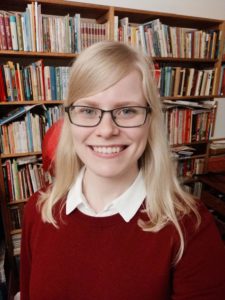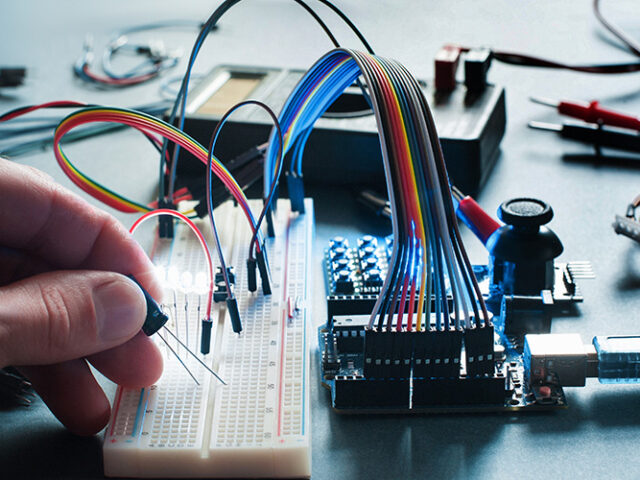To continue raising awareness of incredible women in STEM for International Women’s Day, Student Circuit caught up with Illona Pohjavirta, a Research Scientist at Vaisala.
Tell me about your journey so far.
My high school in Tampere, Finland, was actually focused on visual arts, another passion of mine besides science. Sometime in my second year I realised that for my future I needed to pick between the artistic and technical fields. I figured that I wanted to keep art as a fun hobby without any pressure to create content. I also thought that a career in the technical field would be the financially safer choice.
In Finland, there’s a system that if you do well enough in your final exams of high school, you can get accepted into many universities without entrance exams, especially in technical fields. I was in the top 150 of the country in the math final exam in that spring and got excellent grades from my other exams as well, so I got accepted to study physics in Aalto University in the capital region of Finland
During my bachelor’s and master’s degrees I majored in engineering physics and minored in chemistry, also taking some courses in material science on the side. I believe in the core of my studies was the wish to understand how all this matter and material around me works. Over the span of my studies, I worked as a research assistant in many different research groups of both physics and chemistry, learning practical research skills. I remember being worried I was studying so many different topics instead of focusing on one, but now I feel it actually has been really important to my career to acquire skills in different fields and to have curiosity for a wide range of topics.
After my MSc degree I decided to see what there is in the industry outside of the academia. I applied for several jobs, among them Vaisala, that many people had recommended to me. The job description had felt very vague, so I thought I had better chances for the other jobs I had applied for. I was positively surprised when I got invited into an interview and absolutely overjoyed when they picked me out of 80 other highly skilled applicants.
I started as a Junior Scientist, and as my responsibilities in the labs grew, I rose to the position of a Research Scientist. In this May, it will be three years since I started at Vaisala. I both feel like I have been here forever and that it cannot have been three years already. It’s been a really good three years to me.
What do you do as a Research Scientist at Vaisala?
I am a Research Scientist at Vaisala, a Finnish tech company specialising in weather, environmental and industrial measurements. Vaisala develops and manufactures products and solutions for demanding measurements for a variety of industries and applications.
I am developing new thin-film sensors for measuring humidity and different gases. For testing these sensors, my duties also include designing, building, validating, automating and the maintenance of the related test instrumentation. As a scientist I also have some supporting tasks for the production in our factory.
In my job I get to use a wide set of my skills: hands-on maintenance of equipment and building instrumentation, measurements and subsequent data-handling, derivation of necessary physical equations, chemistry lab skills, programming for automating instruments, searching for information and reading scientific papers, and reporting my results and documenting my work and different processes for other people.
I get to work together with people with different backgrounds and skills. I enjoy it a lot because I can constantly learn and try all kinds of new things in my job.
What sparked your interest in STEM?
I had my first physics class at school when I was 11 years old. I checked out my new textbook and started reading about the capillary action and was immediately mind blown. I had wondered why the water surface was rising up towards the edges of a glass, and now this book was suddenly explaining all these small mysterious things that I had seen around me! I was a huge Harry Potter fan at the time, and I remember thinking that physics is the closest thing to magic in real life. I think this was my awakening as a scientist.
As an engineer, I awakened with the Pythagorean theorem a few years later. I had been making gingerbread houses for Christmas on many years, but as soon as I browsed through my new math textbook at school, I saw that this equation could be used to exactly calculate the size and shape of the parts. Things got even better with the trigonometric functions. I felt like I could build any 3D shape out of flat pieces of gingerbread. It was awesome.
What are your biggest achievements so far?
I think the moments I am the most proud in my education are getting my MSc degree and graduating with honours as well as getting the results of my MSc thesis published in a scientific paper. I am also very proud that I was chosen for my current job out of 80 other highly skilled applicants. Rising from a Junior Scientist to a Research Scientist as my responsibilities in our projects and labs have grown also felt very good.
Did you have any key influences growing up that led to your career choice?
My father is a mathematics professor, so I grew up making drawings on the backside of his scrapped lecture materials full of integrals, derivatives, matrices and so on. The five-year-old me thought math looked cool and pretty. Throughout my life my father has also had all kinds of interesting and funny science projects at home. There’s no way this has not influenced me. Without the influence of my father, I really might have ended up more interested in something else.
With my father working at the university, I believe I also got a little bit better sight into what studying in a STEM field at university could be like, so it likely felt easier to choose to study there because of that. I still think my parents were very careful not to ever push me to choose this or any other field. I also never much consulted my father with my coursework, to his surprise. The reason was that these consultations rarely if ever reached any helpful conclusion as we would actually quickly end up in a disagreement over the method you were supposed to use to solve the problem to begin with.
What are some key challenges you’ve faced?
Yes, in the end of my Master’s there were big decisions, re-planning, and on top of that all kinds of rumble in my private life. It was a huge tipping point in my life in so many ways, and at parts I felt quite alone with those decisions.
The hardest decision was to go to see what the industry is like instead of pursuing a PhD. I realised that having only had jobs in the academia had left me with a huge big blind spot for the “real world”. I felt like I needed to first see with my own eyes if I needed a PhD for doing the things that I want to do.
Do you have any key inspirations?
I don’t think I can name any one person as a key inspiration. Out of famous physicists I would name Lise Meitner. The female professors and research group leaders I met at the chemistry department at Aalto University were great people. Currently my biggest inspiration are my colleagues. They are really cool and nice people and have made me realise many things about myself and what I would want to be like. I look up to them very much.
For example, I have a colleague who is a combination of a successful hard scientist, engineer and then I would say a kind of a princess, without any clash. She was organising her dream wedding and of course wanted everything to be perfect. She had planned to have people blow soap bubbles in the wedding but found the commercially available soap bubbles deeply unsatisfactory. So she of course thoroughly studied the science behind the bubbles, listed the needed qualities for her bubbles, ordered necessary chemicals online, went to the lab and optimised and tested the bubble liquid to fit her needs. A perfect engineering process. I am so happy people like her exist, she’s brilliant.
In light of International Women’s Day, do you think there is still a lack of diversity in tech?
Simply, yes. How bad the situation is of course depends on the field, depends on the company and depends on how high in the hierarchy people are. But all in all, I think we are currently wasting a lot of potential and missing out on many new useful and ground breaking ideas and innovations by not having a more equal representation of different people in tech. A lot of skilful people are choosing to pursue careers in other fields instead and this is a problem.
What can be done to encourage more women to work in STEM?
When someone decides to pursue a career in something, I feel like there are commonly two big reasons behind it: either you enjoy studying and working with this topic, or you wish to become someone who is in a role matching that education. So, it boils down to how enjoyable the everyday life with that topic and in that field is and having role-models.
The everyday life in the field is of course about how interesting you find the topics of your studies and work, but this interest can easily be killed by feeling somehow out of place or having to worry if others around you treat you fairly. Can your everyday life be fun if you feel like you can’t find any like-minded people in your studies or work? If you make a mistake, will you have to worry others believe you made that mistake because of your gender instead of the fact that you slept poorly last night or just because mistakes are human? Will you have to worry that your proposals and ideas get worse treatment because of your gender?
To make sure everyone can enjoy the actual content of their studies and work and get their job done efficiently, the guidelines of how to treat others fairly and respectfully should be made clear to everyone. Universities are usually meeting places for people who have grown up in very different environments – people of different ages, people from different homes, cultures and countries. I believe everyone, student, lecturer, post-doctoral researcher or professor, should receive mandatory training how to make sure everyone can study and work in peace. And if things go wrong and when mistakes happen, there needs to be an easy channel for people in every role to report problems. Problems should then be discussed openly but also respecting everyone involved. Turning a blind eye to these things and claiming that “no such measures are needed because these problems don’t exist in our society” only make you look incompetent nowadays.
Representation and role-models are also very important in inspiring people to choose this field. You don’t realise how important representation actually is until you meet someone who you think could be you in the future and shows you a new possible path you hadn’t thought of before. Someone who you see and think “wow, I would want to be like this person!”. This means we need women, and in general more diverse people in visible positions throughout the field.
Have you ever faced prejudice due to your gender?
I am really happy to say I have not encountered or been aware of any prejudice from anyone in a key role to my career (e.g. people in recruitment processes, thesis supervisors or managers). However, in one of my previous jobs I had to work with a person who felt that people of my gender couldn’t possibly work in that field at a serious level. He was very vocal about it and his disappointment that I was working there. I had my scientific results belittled, was directly told to go study another field that I would be “better suited for” and witnessed complaints about how I had been given tasks that I “possibly couldn’t do a good job” with as a woman. I was doing quite well in my job, so these comments mainly made me think he was probably having a hard time in his life somehow and was taking it out on me.
Trying to work with someone like this can be very frustrating and stressful, and it can be hard to get very good results without functioning teamwork. Often it’s impossible to end the harmful dynamic from within the conflict, so the role of the people around is highly important. Luckily my other colleagues and the person in the leading position directly addressed his attitude and condemned his opinions, taking care of the team. We still got some pretty good scientific results in the end!
I feel like there are many skilled women who don’t choose STEM because they are afraid they would somehow feel out of place, regardless of how much skill they have. They might feel like it could cost them a lot of extra effort to work in this field instead of somewhere else where they feel they wouldn’t need to worry about these things.
To these people I want to say let your skills speak for yourself. The places that have a successful future care about your skills and the insights you can bring. There are many fun, caring and great people in this field who you would enjoy working with and who would vice versa enjoy working with you. There are so many cool things we can achieve together!





